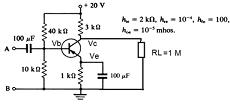Common Emitter Gain
Please find the Gain of the Common Emitter amplifier. Use the given $h$ parameters. Assume $R_L=1 MOmega$.

For a good approximation you just need to know $β=h_{fe}=100$
$V_b=20 V*10K/(10K+40K)=4V$
First approx is $V_{be}=0.7 V$
$V_e=V_b-V_{be}=4-0.7=3.3 V$
$I_e=V_e/R_e =3.3/1K=3.3 mA$
$I_c=αI_e=β/(β+1) I_e=100/101*3.3 m=3.267 mA$
$V_c=20-I_c*R_c=20-3.267m*3K=10.2 V$ so $V_{ce}=V_c-V_e=10.2-3.3=6.9 V$
From here with the other $h$ parameters one can iterate to find better values for $V_{be}$ and $I_e$. But with an accuracy of 5% $I_e=3.3 mA$. The gain is
$G=frac{ΔV_out}{ΔV_{in}}=frac{ΔV_c}{ΔV_b}=frac{ΔV_c}{ΔV_e}=frac{(-g_m (R_c ||R_L))}{(g_m (R_e+r_e))}$
with $g_m=frac{ΔI_c}{ΔV_b}=frac{ΔIe}{ΔV_b}$ the transconductance
The load of transistor is $R_c ||R_L$ (as I said it is like the Thevenin equivalent resistance in the collector: the voltage source is like a short-circuit so that $R_c$ appears in parallel with $R_L$). The emitter “intrinsic” resistance is
$r_e=kT/I_e =(0.026 V)/(0.0033 A)=7.88 Ω$
$G_{DC}=-frac{R_c ||R_L}{(R_e+r_e)}=frac{3K ||1M}{(1000+7.88)}=-(2.99 K)/1008=-2.97$ in DC
In AC because of $C_e$ (emitter capacitor) there is just $r_e$ resistance in emitter
$G_{AC}=-(R_c ||R_L)/r_e =-(3K||1M)/7.88=2.99K/7.88≈379$ in AC
